Iran Says Its Military Power Complements Foreign Policy
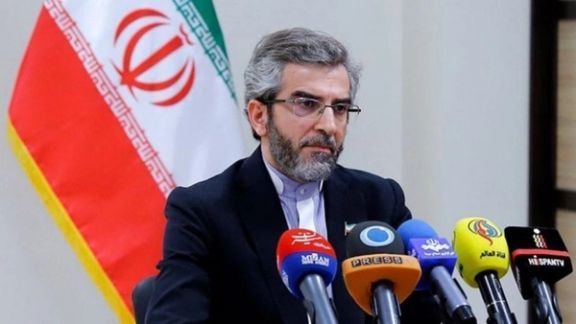
Iran's Deputy foreign minister and chief nuclear negotiator Ali Baqeri-Kani says Tehran's foreign and military policies are synergistic and complementary.

Iran's Deputy foreign minister and chief nuclear negotiator Ali Baqeri-Kani says Tehran's foreign and military policies are synergistic and complementary.
Speaking at a meeting with a group of army commanders on Sunday, Baqeri-Kani said that the Islamic Republic has thwarted the enemy's trick in driving a wedge between foreign policy and defense policy thanks to resistance under the guidance of Supreme Leader Ali Khamenei.
He said the discourse of resistance is dynamic and promotes stability, adding that lasting regional security depends on resisting aggression and occupation.
The Iranian diplomat also criticized regional Arab governments for normalizing their relations with Israel, saying such moves will never help those countries feel secure, noting that “History has proven aggression and occupation will never lead to order, stability and calm.”
“The interaction between some regional governments and the Zionist regime is similar to taking refuge in a wolf’s lair to protect oneself from the blissful spring rain”, he added.
Israel’s establishment of full relations last year with the United Arab Emirates and Bahrain was a sign of Tehran’s inability to isolate its archenemy in the region.
Baqeri-Kani, who is also Tehran’s top negotiator in Vienna talks to restore Iran’s 2015 nuclear deal known as JCPOA, made no comments about the current state of the negotiations, which came to a halt in March as Tehran demanded the removal of its Revolutionary Guard from the US list of terrorist organizations.
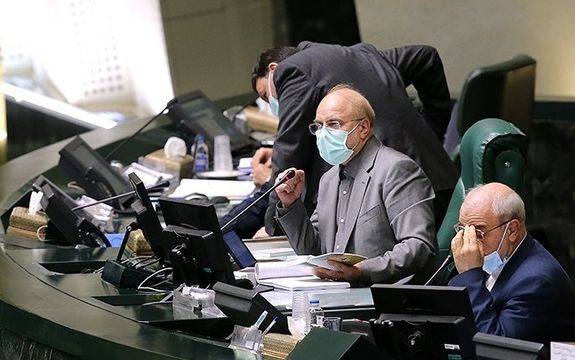
Lawmakers on Sunday strongly criticized the unbridled rise in living costs in Iran, while officials try to blame the former government for the economic crisis.
Lawmaker Alborz Hosseini warned the president and his economic team in a speech Sunday about the rising cost of living. He called the daily increase in food prices a "tsunami" and added that rents were rising uncontrollably. "It seems that nobody is thinking of vulnerable classes."
"Food on people's tables is becoming scarcer by the day and cars have become a commodity they cannot hope to own," Fathollah Tavassoli, another lawmaker, told the Parliament.
In his pre-agenda speech Sunday, Parliament Speaker Mohammad-Bagher Ghalibaf blamed previous administrations for inflation which according to official figures has now risen above 40 percent and urged the government of President Ebrahim Raisi to take action to bring the hike in prices under control.
Ghalibaf, apparently still tries to protect Raisi from rising criticism, but others say blaming the former government is simply not an answer to the crisis.
Raisi has not been able to achieve much since last August when he took office, except more clandestine oil exports to China because of less strict US implementation of sanctions by President Joe Biden’s administration. Raisi government officials boast having doubled oil exports.
But many are now asking why higher oil sales have made no difference in the economy. The government mouthpiece, Iran newspaper, said this week oil revenues are spent to offset part of the 4.7 trillion rial budget deficit inherited from the government of former president Hassan Rouhani.
The newspaper argued that "Improvement in economic indices only through increasing oil exports is not feasible because other factors such as liquidity growth also affect indices such as the inflation rate.”
President Raisi and his hardliner supporters often openly or indirectly blame Rouhani for the long-running economic crisis. Raisi on Friday said "four years of inflation above 40% and negative economic growth rate" were the main reasons for the hike in prices.
But few people dare to say publicly that the long-running economic crisis is mainly the result of sanctions imposed by the United States over Iran’s nuclear program and a new deal is imperative for saving the economy.
According to official figures the annual inflation rate rose to over 40% in the previous Iranian calendar year that ended March 20. In the same year the rate of inflation for food was even higher at 51%. Inflation rate has only risen to above 40% twice in four decades in the history of the Islamic Republic.
In his televised speech to mark the Persian New Year on March 20, Supreme Leader Ali Khamenei admitted that Iranians had faced “hardships, high prices and inflation” in the previous year but said expecting the problems to go away quickly was not "realistic".
Pundits say blaming the country's multiple crises on Rouhani and will not resonate with the public, who understands that Raisi had eight months to make an impact on the situation, and he has failed.
In the past few days Iranian media have strongly criticized the government for what they say is inefficiency and ineptitude and highlighted the hike in the prices of food items such as rice, meat, and vegetables.
Domestically grown rice, for instance, has now become unaffordable to most families. According to data published by the Statistics Center of Iran (SCI), the price of various types of domestically grown rice has tripled in one year and risen by around 11% in March alone.
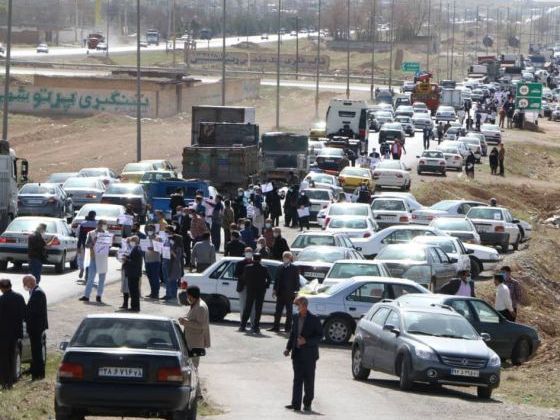
A group of residents held a protest rally in southwest Iran against a project to transfer water out of Chaharmahal-Bakhtiari province, causing water scarcity in their region
During the protest in the provincial capital of Shahrekord on Sunday, protesters carried placards and chanted slogans threatening to take up arms against the ‘mafia’ behind the redistribution project.
The head of the farmers' union of the province, Morteza Derakhshan, said the rally was held to protest the Golab Water transfer Tunnel.
Last week, videos of the second phase of the water transfer project surfaced in social media, despite the opposition of Iran’s Department of Environment to the plan.
The Golab tunnel, with an approximate length of 10 kilometers, The Gulab is supposed to transfer water from the Zayandeh-Roud tributaries in Chaharmahal-Bakhtiari province to Kashan.
Over 20 people arrested during similar protests seven years ago were sentenced to prison terms and lashes earlier this month after a complaint by Khatam-al Anbiya Construction Headquarters, the engineering and construction arm of the Revolutionary Guard.
Chaharmahal-Bakhtiari, a traditionally water-rich region in the Zagros mountains, has seen its water resources decline due to both drought and projects to irrigate other arid regions.
Iran has been suffering from drought for at least a decade and this year officials have been warning of a further decrease in precipitation.
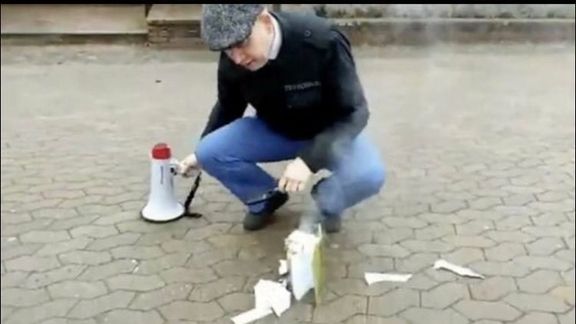
Iran says it holds the Swedish government accountable for burning of the Quran by leader of Danish far-right political party Stram Kurs or Hard Line.
Condemning the desecration, Foreign Ministry spokesman Saeed Khatibzadeh said on Sunday that the Islamic Republic is waiting for Stockholm's immediate, strong and clear reaction against the perpetrators of the insulting act and practical measures to prevent such moves.
Leader of the right-wing extremist party, Rasmus Paludan, went to an open public space in southern Linkoping -- a heavily Muslim-populated neighborhood on Thursday, put the Quran down on the ground and burned it while ignoring protests from onlookers.
The intentional repetition of the anti-Islam blasphemous act in the Muslim fasting month of Ramadan has hurt the feeling of Muslims both in Sweden and across the world, Khatibzadeh said.
The Foreign Ministry also summoned the chargé d'affaires of Sweden to convey the Islamic Republic’s protest at the desecration.
Malaysia and Indonesia along with the Swedish Islamic Center and many other groups and organizations also strongly condemned the provocative action.
Iraqi Shia cleric and the leader of Sadr Movement, Muqtada al-Sadr, called on the Iraqi Foreign Ministry on Saturday to summon the Swedish ambassador
Since Thursday, a number of cities across Sweden, such as the Stockholm suburb of Rinkeby as well as in the cities of Linkoping and Norrkoping, were scenes of violent clashes with social media videos showing young men smashing windows of police cars and shouting “Allahu Akbar” (God is greatest).
Paludan is a Danish lawyer who also holds Swedish citizenship and set up Stram Kurs in 2017 with an anti-immigration and anti-Islam agenda. He once burned the Quran in 2019 and also wrapped the book in bacon and tossed it in the air. In 2020, Paludan was banned from entering Sweden for two years and was also prevented from entering Germany for some time after he announced plans to hold a similar demonstration in Berlin.
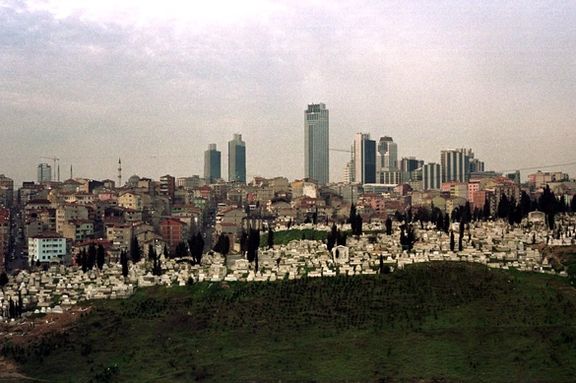
A new report by the Turkish Statistical Institute shows that Iranians are still at the top of the list of foreign residential property buyers in Turkey in March.
According to the report published on Friday, Turkey clinched its best March ever in terms of property sales as Iranian citizens bought 784 homes, topping the list followed by Iraqi citizens with 741 units and Russian citizens with 547.
Iranians bought 2,256 residential units in the first quarter of this year, while Turkey has recently increased the minimum monetary value needed by a foreigner to apply for citizenship investment program from $250 thousand to $400 thousand.
House sales to foreigners rose 31 percent in March compared to the same month last year to 5,567. The purchases by foreigners were over four percent of all home sales in March with Istanbul on top of the list followed by the Mediterranean resort city of Antalya and the capital Ankara.
Total Turkish annual home sales also rose 20.6 percent in March to 134,170 houses amid declining supply and soaring prices, but industry representatives say the data show that households continue to view real estate as an attractive investment tool.
A senior member of Iran’s parliament said in October 2021 that Iranians bought $7 billion of real estate in Turkey in about three years from 2018 to 2020, with estimates of 3,000 residential units every year.
By buying property in Turkey, Iranians try to protect their capital as the country’s currency keeps falling and hope to gain Turkish citizenship and be able to do business without being restricted by US sanctions, which make it hard for Iranians to even open bank accounts in other countries.
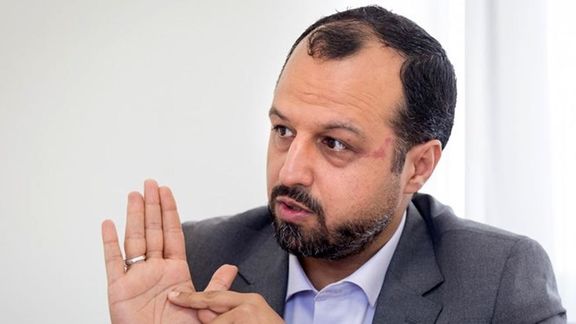
An alleged American delay in issuing a visa has led Ehsan Khandouzi, economy minister, to cancel his attendance in Washington at the World Bank and International Monetary Fund spring meetings.
According to a statement from the Ministry of Economic Affairs and Finance Saturday, the United States has violated its commitments over hosting international events and was obstructing, not the first time, the attendance of Iranian delegations at international events taking place in the US. Washington has not responded to the charges.
Ehsan Khandouzi, who has been in office since last August and has called for tighter monetary control, had planned to lead the Iranian delegation to the World Bank-IMF spring meetings due April 18-April 24. The meetings are expected to focus on the detrimental fall-out from the Ukraine war, particularly with poorer countries of the global ‘south’ facing rapidly rising commodity prices including foodstuffs.
In February, the Iranian national freestyle wrestling team had to call off a trip to Arlington, Texas, for a friendly match after the US government refused to issue visas for six members of the party, including Alireza Dabir, the chairman of Iran's Wrestling Federation, two wrestlers, a coach, the team manager, and a referee.